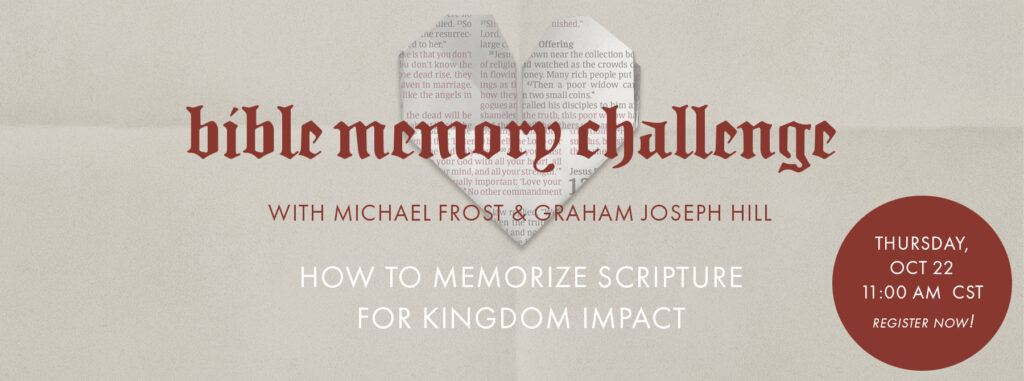In his letter to the Romans, Paul takes eleven chapters to explain the big ideas that frame Christian belief—human sin, God’s judgment, God’s grace, the centrality of faith, the work of Christ, Christian hope, and the place of Israel in God’s plan. He paints these ideas in big, glorious brushstrokes. But then, as he launches into his twelfth chapter, he draws down to the fine detail. What does all this mean for you Romans? Well, in light of everything I’ve just explained to you, Paul says, God asks you to surrender everything you have, body and soul.
That is, offer your bodies as living sacrifices (12:1) and submit to the renewing of your mind (12:2). That’s the beautiful dance of orthopraxy (right behavior) and orthodoxy (right belief).
Body and soul.
Outer actions and inner thoughts.
Offer it all to him.
However, Paul knew that before the recently-converted Romans could embrace godly living, they needed their minds to be renewed.
The Greek word Paul uses for this renewal is anakainōsis, which means “a complete renovation,” like on one of those house flipping reality TV shows. Imagine Paul hosting a home improvement show and walking into the filthy, derelict house of the pagan mind. In Romans 3, he already told his readers that no one is righteous, no one understands, no one seeks God (Romans 3:10-12). It’s dark in that mind of yours, he’s saying. You need God to turn the lights on and begin the work of tearing out the drywall, ripping up the floorboards, knocking down walls, and repairing and restoring the whole thing.
Imagine Paul hosting a home improvement show and walking into the filthy, derelict house of the pagan mind.
Tweet
This is as true for us today as it was for the first-century Romans. We might not need to purge ourselves of our old Roman pagan worldview, but we do need to retrain our brains to be less self-focused and self-defeating and to be centered more on Christ.
As Paul tells the Colossians, “Set your minds on things above, not on earthly things” (Colossians 3:2, NIV).
So how can we keep our minds from dwelling on unhealthy, untrue, or distracting thoughts? How can we expand our understanding of God and God’s will so as to please him with our obedience?
Sticking with the home renovation metaphor, I’d like to suggest that the renewal of our minds is achieved by allowing Scripture to remodel our thought life. Such a restoration can occur in a number of ways—personal and group Bible study, meditating on Scripture, listening to podcasts and sermons from great Bible teachers, attending conferences and seminars, formal theological study, etc.
I think of these things as the structural work of refurbishing and revamping our worldview. This isn’t simply a Marie Kondo tidy up. This is more like Extreme Makeover. We need to allow Scripture to tear down wrong thinking and build up a better outlook.
But how does Scripture memorization fit into all this?

I’m going to stick with the home improvement comparison and say that Bible memorization is like the new paint job on a renovation project.
Stay with me. Renovating a house is hard work. So is committing to the deep study of Scripture. Reading the Bible, taking courses, attending retreats, studying biblical truths, integrating your learning and practice, all this requires commitment and tenacity. It’s like removing asbestos, replacing the roofing or installing an HVAC system.
This renovation of the architecture of the mind is ongoing and lifelong.
But the paint job, well, that’s the most visible part of a home renovation.
Everyone knows that house painting is one of the most important home maintenance projects you can do. Maintaining the painting and caulking helps to protect a house from weather damage caused by water and sun.
Memorizing Scripture is like that. It’s a maintenance project. Do the hard structural work of devoting your mind to Scripture, but the memorization of important Bible passages helps to confirm, strengthen, and protect what you’ve been learning.
And just as neglecting peeling exterior paint can lead to high siding replacement costs for a house, neglecting to memorize Scripture can lead to you forgetting the things you’ve learned in deeper study.
This is something educationalists and historians have known for a long time.
In her book Heart Beats: Everyday Life and the Memorized Poem, Catherine Robson explores how the memorization and recitation of poetry changed people from a previous era by changing the world in which they lived. It is a fascinating study of the history of rote learning and the public recitation of poetry, which was a mandatory teaching practice in England from around 1875 to the mid-1900s.
Memorizing Scripture a maintenance project. Do the hard structural work of devoting your mind to Scripture, but the memorization of important Bible passages helps to confirm, strengthen, and protect what you’ve been learning.
Tweet
Robson says there were a number of reasons for its extensive use: (a) to foster a love of poetry and words, (b) to boost a child’s confidence through a mastery of elocution, while also purging the idioms and accents of lower-class speech, (c) to exercise the brain, as Plutarch suggested, and (d) to develop nationalistic zeal through the construction of a highly patriotic canon of poems that promote English values.
In other words, poetry recitation was used to make English kids properly English (as it was understood at the time). When Victorian-era children recited, “The boy stood on the burning deck,” they were doing more than exercising their brain. They were being made by the words.
A case could be (indeed should be) made that memorizing portions of the Bible can make Christian people properly Christian.
So memorization isn’t the primary way of renewing your mind, but it is a powerful way of confirming and establishing what you’ve been learning. I think this is what the psalmist means when he writes, “I have hidden your word in my heart that I might not sin against you” (Psalm 119:11, NIV).
In my book Hide This in Your Heart, co-authored with Graham Hill, I make the case for Scripture memorization, but not as an end in itself. We all know you can’t just slap a new coat of paint on a house that’s falling apart. A full renovation has to happen, but memorization, like the paint job, demonstrates that a makeover is underway.
In that respect, memorizing Scripture shouldn’t just help us internalize the key themes of our faith or overcome personal difficulties. We need an approach to Bible memorization that helps us embrace a Kingdom and missional theology, that leads us to whole-of-life discipleship, and that aids the Jesus-reflecting and activist Christian life.
But more than all that, Scripture memorization bridges the gap between bodily sacrifice and the renewal of the mind. Memorization is a kind of physiological activity as much as it is a cognitive one. Writing for the New York Times on the memorization of poetry, poet and novelist Brad Leithauser says,
“The best argument for verse memorization may be that it provides us with knowledge of a qualitatively and physiologically different variety: you take the poem inside you, into your brain chemistry if not your blood, and you know it at a deeper, bodily level than if you simply read it off a screen.”
That applies to the Bible as much as it does to poetry. We need to take the Scriptures into our brain chemistry, our bloodstream, our bodies. Memorization is not just a way to renew your mind, it is also an act of offering your body as a living sacrifice.
In Hide This in Your Heart, we offer an approach to Bible memory that immerses you in many of the great (but often forgotten or neglected) themes of Scripture. These include hospitality, reconciliation, justice, peacemaking, compassion, love of enemies, sentness, and more. As you memorize (and visualize) and learn (relationally and through practices) key verses related to these biblical themes, you are empowered to do what Paul was asking the Roman Christians to do—“to test and approve what God’s will is—his good, pleasing and perfect will” (Romans 12:2).




Thanks for this very good information, my body is fighting me repeatedly to keep smoking cigarettes and I need to renew my mind. Hope this helps!